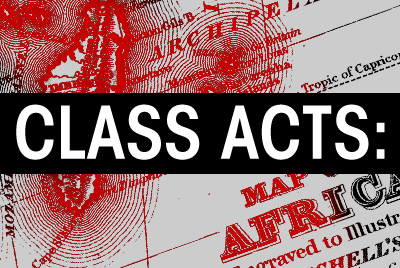Editor’s Note: According to a recently produced “diversity timeline,” the Du Bois College House, a residence hall on the campus of the University of Pennsylvania, began “as an experimental living-learning program for African-American students” in 1972. The house was named for William Edward Burghardt Du Bois (1868-1963), a prolific scholar and cultural critic. During that same historical moment, Penn initiated its Afro-American Studies Program as an intellectual space responding to the widespread demand for Black Studies course across the country.
As another semester winds down, many of us who participated in Introduction to Africana Studies 101—a course offered by the Center for Africana Studies and in the long shadow of these early Black Studies efforts at Penn—are reflecting on what we experienced. The class was a diverse group in everyway. In this post, a white student from the class considers how the experience might shape not only his intellectual profile but his future cultural politics as well. Is the “Africana project” for all?
________________________________________________________________________________________
The following question is not an easy one for a white kid to ask. It’s an uncomfortable thing to walk along a racial “line,” and even more so when think you may be close to crossing one. But sometimes in the pursuit of knowledge, we have to take risks. As Dr. Guy Ramsey reminded me, “Nothing ventured, nothing gained.” And he was right: in the course of asking my first question, I was led to a second one– one that shed light on my role as a student in the field of Africana Studies.
Here goes.
As I walked toward 40th Street a few weeks ago, I observed a group of African-American students emerging from the W.E.B. Du Bois College House. At first I just watched this in passing without much contemplation. But then I thought of my observation in the context of Du Bois’s book, Black Reconstruction (1935), which I had just reviewed in my Africana Studies class. What is the significance of this college house, intended to encourage African-American social consciousness and scholarship? Is it a positive institution, inspiring the sort of community and scholarship whose lack were the primary reason Du Bois wrote Black Reconstruction in the first place, or does its location at the northwestern corner of campus housing contribute even further to the “color line” that Du Bois called the “problem of the twentieth century?”
I don’t know the answer. If I had to guess, using my knowledge of Du Bois’s pursuit of scholarship to rewrite an American history that had been distorted by white writers and historians, I would say its contribution is positive. But is it possible, however, that this pluralism is a return to the structures of segregation that Civil Rights Era leaders and their predecessors fought to erase? I’ll stick with my intuition and trust that the college house is, in fact, living up to its name. But another thought still lingers on my mind: who am I to ask a question like this in the first place?
At first I might hesitate to ask a question of this sort – a question which some might say I am not qualified to ask. But perhaps my academic motives encourage me to continue questioning in the same way that the scholarly motives of the college house substantiate it as a positive contribution to the African-American community. If I, the student, am sharing in the historical knowledge, shouldn’t I also share in an open discourse?
The conclusion I have reached is this: if I am pursuing the awareness, then I, too, am a part of the community. Surely not firsthand, but at least on an academic level, I should feel comfortable enough to ask a touchy question. In fact, I might even owe it to myself as a student in the field of Africana Studies to do so. If I restrained myself to asking superficial questions, I would only gain superficial insight. As a legitimate student, I should be compelled to ask legitimate questions.
-A. Maxman
Tags: Africana Studies, Black Reconstruction, Black Studies, Du Bois, University of Pennsylvania



 Share On Facebook
Share On Facebook Tweet It
Tweet It





